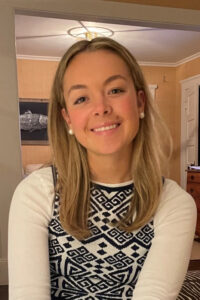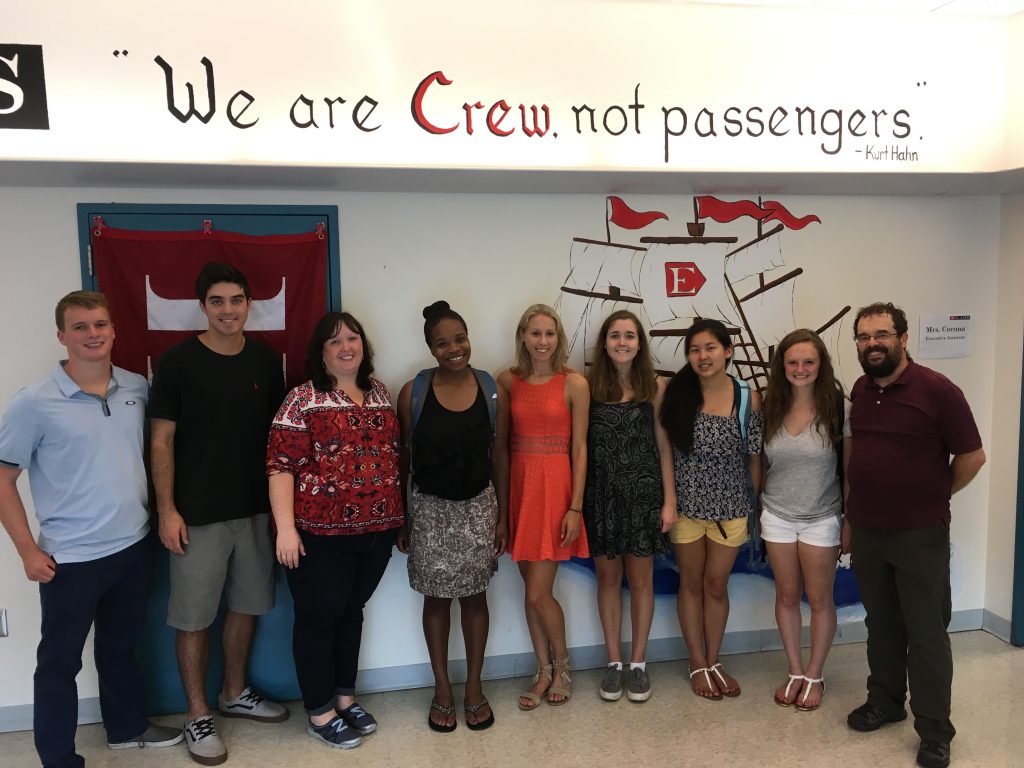Kate Whitman ’23 Reflects on ‘Fulfilling Opportunity to Learn and Give Back to the Hartford Community’
Kate Whitman ’23, a sociology major and rhetoric, writing, and media studies minor from Bedford, New York, is a part of the Ivy Society at Trinity and sings with the Trinitones, Trinity’s oldest all-female a cappella group. She also is a student-writer for Trinity’s Office of Communications. Below, Whitman reflects on a formative experience in a Community Learning course during her first year at Trinity:

I knew I wanted to study the social sciences at Trinity, but I was unsure of which one would fit me best. I took a bunch of different 101 courses, and ultimately landed on a major in sociology. Because Trinity is a liberal arts college, I was still able to take courses in other fields that sparked my interest, even if they didn’t fall under my major or minor.
In my second semester, I enrolled the Education Studies 200 course, “Analyzing Schools,” with Director of Social Science Research and Lecturer in Sociology Daniel J. Douglas. I had heard great things about Trinity’s Educational Studies Program and the wide range of courses it offers. The course had a classroom component and a community learning component. In class, we would discuss how social constructs and factors impact the educational opportunities students have in the United States. The course also included psychological and physiological perspectives, creating a more in-depth opportunity to analyze educational systems through the social sciences. At this point in my Trinity career, I had decided I was going to major in sociology, so being in a course that implemented sociological perspectives and ideas was very helpful for my future sociology (major-related) courses.
The community learning component of the course allowed students to participate and observe at a local K-12 school once a week. I was assigned a first-grade class at the Expeditionary Learning Academy at Moylan School (ELAMS). ELAMS is a neighborhood school in Hartford, so all the students who attend need to live within a certain proximity to the school, which also happens to be right next to Trinity.
Every Monday afternoon, I would walk into the school alongside the parents dropping off their children. We were all going in for the same reason: to learn. I would help the teacher with her class lessons, which sometimes consisted of reading aloud to the class and other times consisted of doing one-on-one work with students who didn’t understand the lessons. I was simultaneously taking notes of my observations for our weekly journal reports of our classroom experience. This activity greatly developed my research analysis skills and helped me in my future sociology research courses. Recording research through an observational lens was a different type of writing for me, which helped me in my rhetoric courses that had assignments with a wide range of writing styles.

At ELAMS, I walked the students to lunch, played with them at recess, and tied their shoes when they didn’t know how. The students were eager to learn and it was extremely rewarding to watch them develop their educational and social skills throughout the eight weeks in the classroom. It was an incredible and fulfilling opportunity to learn and give back to the Hartford community. (Unfortunately, the community learning component of the course was cut short when classes went online because of the COVID-19 pandemic.)
Not only was it a great experience working with the students and faculty at ELAMS, but it was also interesting taking what I was learning in my “Analyzing Schools” course and applying it to a real-life situation. Through my observations, I was able to analyze the class through a sociological, physiological, and psychological lens, which I wouldn’t have been able to do without the help of Professor Douglas. I used these newfound skills in other humanities courses, such as my “Research Methods in the Social Sciences” sociology course, also taught by Professor Douglas, where I studied school uniform implementation and its effects on suspension and expulsion rates.
Taking the “Analyzing Schools” course in my first year prompted me to get more involved with other opportunities on campus. Trinity has so many different things students can get involved with, on and off campus, and this course showed me that trying something new—in this case, community learning—is beneficial to my education. Since this course, I’ve taken two more educational studies courses and two more courses with Professor Douglas. I plan on taking more educational studies courses and community learning-based courses before I graduate from Trinity.
I am not currently planning on being a teacher in the future, but I took useful lessons from working in a first-grade classroom. It is a very rewarding feeling to make a difference in a first-grader’s life through their education.
Read more about Community Learning at Trinity here.
